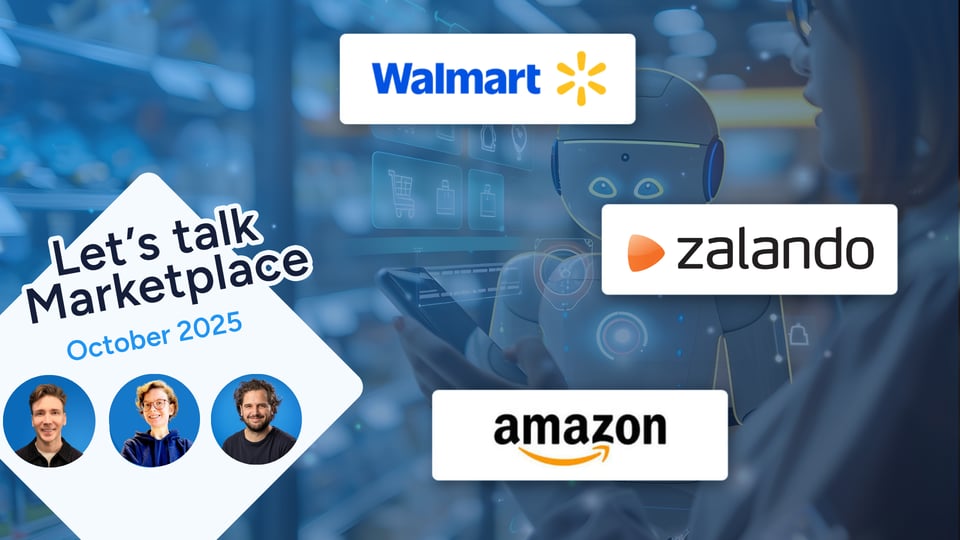🏪 Walmart’s AI-powered marketplace play
Walmart is pushing deeper into AI-driven commerce and exclusive partnerships to expand its marketplace ecosystem. The retailer teamed up with OpenAI to launch Instant Checkout inside ChatGPT, allowing shoppers to purchase Walmart products directly through the chatbot, a first step toward a fully conversational shopping experience.
At the same time, Walmart added Stadium Goods’ premium sneaker catalog to its marketplace, giving customers access to coveted footwear from brands like Nike, Jordan, and Ugg ahead of the holidays. This collaboration boosts Walmart’s presence in collectible and streetwear categories, reinforcing its strategy to become a go-to platform for both mainstream and niche shoppers.
With initiatives like these, Walmart positions itself as a tech-forward marketplace challenger, blending authenticity, accessibility, and AI innovation.
🛒 Amazon doubles down on AI and convenience
Amazon continues to reshape the ecommerce experience with new AI-powered and delivery-focused innovations. Its latest feature, Help Me Decide, uses AI to recommend the best product for each shopper, explaining exactly why it’s the right fit - from browsing behavior to purchase history. This expands Amazon’s personalization suite, which already includes AI assistants like Rufus and Interests.
Meanwhile, Amazon also rolled out a one-tap “Add to Delivery” feature, letting Prime members easily add items to existing orders without extra fees. Alongside this, the company removed the default two-day handling time, pushing sellers toward faster fulfillment with stricter one-day or same-day standards.
Together, these changes reinforce Amazon’s focus on speed, personalization, and frictionless purchasing, but they also raise the bar for marketplace sellers who now face tighter operational expectations in exchange for better conversion rates.
🤖 Shoppers trust AI, but not enough to let it buy for them
AI continues to transform the way consumers shop, but trust remains a barrier to full automation. A recent Riskified survey found that nearly three-quarters of global shoppers use AI in their purchase journeys, often for product research, price comparison, and review summaries. However, only 13% have let AI complete a purchase for them, with concerns around payment security, privacy, and accountability still holding many back.
Experts note that the challenge isn’t technical but psychological; shoppers want transparency and reassurance before handing over buying power. For ecommerce players, this highlights an opportunity: the brands that build consumer trust through clear, ethical AI use and visible accountability will be the ones to win loyalty as AI shopping agents move from advisors to actual buyers.
Want to be ready when AI becomes your next sales channel? Be among the first to activate integrations for ChatGPT, Perplexity and more, and get your catalog ready for launch. Sign up to stay informed about upcoming AI integrations!
🌍 Zalando lands in Portugal, brings beauty to Spain
Zalando opened Zalando.pt with 200,000 fashion and sports items, targeting a Portuguese ecommerce market expected to grow from about €4.1B to over €6.6B by 2029. The launch includes tools like the Zalando AI assistant and Trend Spotter to make discovery more personalized and fun.
The retailer is now active in 26 countries and plans to hit 28 with upcoming launches in Greece and Bulgaria. In parallel, it introduced a beauty category in Spain, adding skincare and fragrances to deepen relevance for local shoppers while curating both international and local brands.
🏗️ Macy's scales automation with new North Carolina fulfillment center
Macy’s has opened a 2.5 million-square-foot fulfillment center in China Grove, North Carolina, as part of its plan to modernize its supply chain through automation. The facility, described as the retailer’s most advanced yet, will handle both customer orders and store replenishment for Macy’s before expanding to other nameplates over the next two years.
With this third deployment of its automation technology and a new warehouse management system, Macy’s expects to double productivity, boost delivery speed, and improve accuracy across channels. The company is also investing $250,000 in local programs, including an automation training lab at Rowan-Cabarrus Community College.
For marketplace managers, the move underscores a growing trend: Retailers are retooling fulfillment networks for flexibility and speed, aiming to keep pace with rising delivery expectations and omnichannel complexity.
📦 Shoppers demand more delivery choice
Nordic consumers are setting a new standard for delivery expectations. Seventy-seven percent now say the ability to choose their pickup location influences where they shop online, and in Finland, parcel lockers already account for 37% of deliveries with younger shoppers leading the shift.
A recent example from THG Myprotein’s collaboration with PostNord shows how simply giving lockers more visibility at checkout can lift both conversion and satisfaction. The message is clear: flexibility at the final step of the journey is now as crucial as price or product quality.
As delivery preferences evolve, retailers must adapt checkout design and fulfillment strategies to keep up.
📖 Download the Shopping Behavior Report to uncover more insights like this.
🇬🇧 TikTok Shop Local backs UK SMEs
TikTok launched Shop Local in the UK, a support scheme aimed at SMEs that sell homegrown products. The program sets aside £750,000 to help five selected businesses start and scale on TikTok Shop, fronted by farmer and TV personality Jimmy Doherty.
To qualify for £150,000 in support, companies must post a TikTok video showing their offer to the local community, include the specified hashtag and @-mention, have 250 employees or fewer, sell locally made products, and not yet be active on TikTok Shop.
TikTok Shop adoption in the UK accelerated last year, with 131% growth in shoppers and 180% growth in revenue. Sellers can leverage Fulfilled by TikTok (FBT), which is expanding across Europe with partners like Fiege in Germany.
✉️ La Poste x Temu: logistics alliance for global reliability
La Poste, via Colissimo, signed a strategic agreement with Temu. The goal is to improve logistics reliability and provide storage and delivery solutions to Temu’s third-party sellers around the world.
For marketplace managers, this points to deeper carrier-platform integrations that can stabilize cross-border SLAs, reduce exceptions, and support seller onboarding at scale.

 Damian Speck,
Damian Speck, Niels Floors,
Niels Floors, Mitchell Dröge,
Mitchell Dröge, Koen Verburgt,
Koen Verburgt, Elodie Sangouard,
Elodie Sangouard,

.png?width=360&height=202&name=Marketplace%20Talk%20jan2026%20(1).png)
